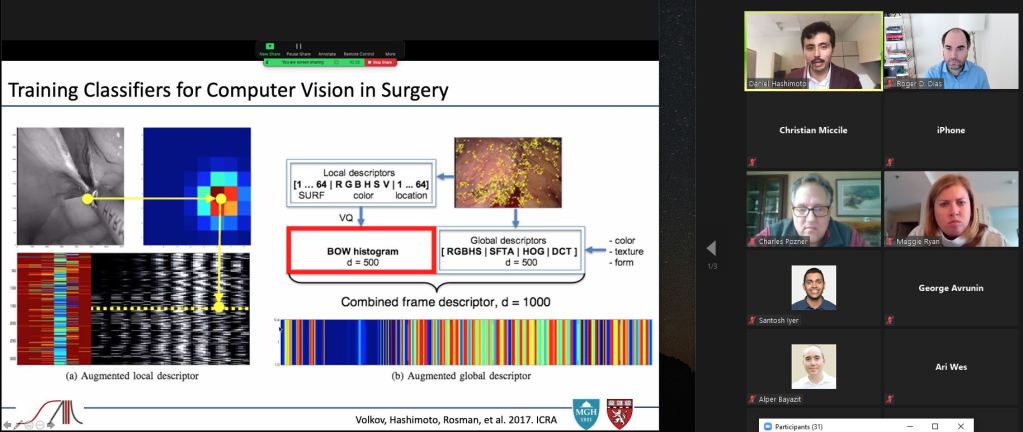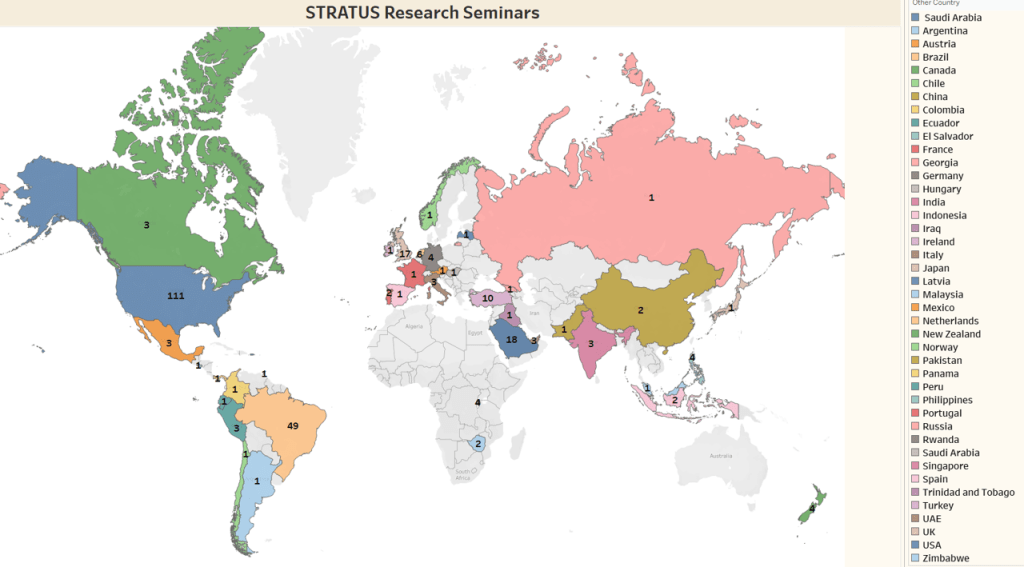In Shift to Online Offerings, STRATUS Center Finds Global Audience

Daniel Hashimoto (upper left speaker), MD, of Mass General Hospital, presents on surgical data science during a recent virtual research seminar hosted by the STRATUS Center.
When the COVID-19 pandemic halted in-person educational experiences earlier this year, the Neil and Elise Wallace STRATUS Center for Medical Simulation didn’t view the loss of on-site interaction as a roadblock. Instead, the center’s leadership team saw it as an opportunity to expand STRATUS’ reach across the globe — adapting its faculty development and instructor trainings for a virtual setting and broader audience.
“This whole thing has really been a testament to the strength of the STRATUS Center and its team,” said Charles Pozner, MD, FSSH, the center’s executive director. “We had no clear anticipation of what might happen, but we were able to pull through and bring STRATUS to the world.”
STRATUS now offers a variety of virtual instructor development trainings, as well as monthly research meetings for medical professionals, instructors and scientists around the world through video conferencing and online collaboration platforms.
Going Global with Online Offerings
The monthly Human Factors & Cognitive Engineering Lab series was introduced pre-pandemic as a way for investigators to discuss their ongoing research projects. Originally, these seminars were intended as monthly in-person research meetings attended by Harvard Medical School students and Brigham researchers.
Since transitioning to an online format at the beginning of March, however, the Human Factors & Cognitive Engineering Lab meetings have expanded to include a global network of research professionals sharing innovative discoveries.
In just nine months, the research seminars have attracted more than 200 attendees from outside the Brigham, hailing from over 40 different countries, according to Roger Dias, MD, PhD, MBA, director of Research and Innovation at STRATUS.
The center has also been fortunate to have several international presenters at these seminars, lecturing on topics such as, “Formulating Qualitative Research Questions: When & How,” “Using Machine Learning to Assess Clinician Competence” and “Learning Analytics in Medical Education.”
Engaging Audiences
Moving to a virtual format has also helped usher the growth of instructor training, said Deborah Navedo, PhD, director of Education at STRATUS. Navedo believes instructor trainings have improved because virtual meetings are so accessible.
“While we have been creative in our hands-on training within the center to protect everyone’s safety around infection control, we are very excited to see that the move to video conferencing for training seminars has increased our visibility beyond our campus,” she said. “We now regularly attract global audiences to discuss best practices in facilitating simulation-based education, especially now that actual clinical settings have become more restrictive to learners.”
As the virtual offerings continue to expand, STRATUS leadership has worked to ensure that large, virtual meetings are just as engaging as in-person learning. Navedo said the team often focuses on making the meetings as interactive as possible by asking attendees questions, inviting them to submit their own and conducting role-playing activities.
“You can always tell if people are engaged based on the number of questions they ask,” Pozner said. “And, so far, it’s been very rewarding to see that a growing number of people feel STRATUS’ events add value to their lives.”
Given the two virtual programs’ continued success, STRATUS leaders expect to keep offering them even after the pandemic.
“It’s much easier to set aside time to log into Zoom than it is to hop on a plane and fly somewhere,” Pozner said. “Our position as a world leader in the virtual medical simulation space may have been spawned by COVID-19, but it will certainly outlast COVID-19.”


Leave a Reply